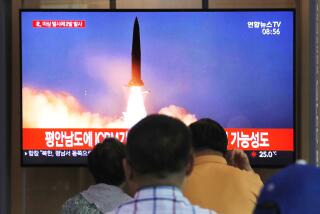Study Links Nuclear War, AIDS-Like Ailments
- Share via
WASHINGTON — Many of those who survived a nuclear war would suffer damage to their immune systems strikingly similar to that now found in AIDS patients, according to a report presented Saturday at a medical symposium.
“Since large numbers of the survivors of nuclear war can be expected to have immunologic deficits like those in individuals with AIDS, a marked increase in the incidence of AIDS and AIDS-related diseases should be anticipated” in the event of such a war, the report said. “Epidemics . . . are likely in the months and years following a nuclear attack.”
Increased exposure to radiation, physical trauma including burns, malnutrition and psychological stress after a nuclear war would impair the functioning of the body’s T-cells--the blood component that defends against bacterial, viral and fungal diseases, the report said.
The abnormalities of the immune system found in AIDS patients are marked by an “absolute depression” of these “helper” T-cells, David S. Greer, one of the report’s two authors, said in presenting the findings of the study. Basically, these “helpers” direct other immune-system cells to attack invaders such as cells of tumors, disease-causing bacteria and viruses.
Dean and Student Study
Greer, who is dean of the Brown University Medical School, conducted the study with Lawrence S. Rifkin, a medical student. Greer presented the results at a symposium on the medical implications of nuclear war sponsored by the Institute of Medicine, which advises the federal government on medical care, research and education.
A major nuclear war would expose millions of people in the Northern Hemisphere to sublethal doses of radiation, and large amounts of smoke from “superfires” in or near cities could trigger a global drop in temperature, or “nuclear winter,” with severe food shortages, the report said.
Greer and Rifkin estimated that 15 million to 25 million Americans would be “at risk” in a nuclear attack “exclusively directed at strategic targets,” and they said exposure to radiation, malnutrition and stress “could increase (imperiled population) in the months and years following an attack.”
Diseases likely to occur after such an attack include tuberculosis, leprosy, pneumonia, legionnaire’s disease and cancer, the report said, as well as the illnesses most commonly associated with AIDS, Kaposi’s sarcoma, a rare skin cancer, and Pneumocystis carinii, a respiratory infection.






